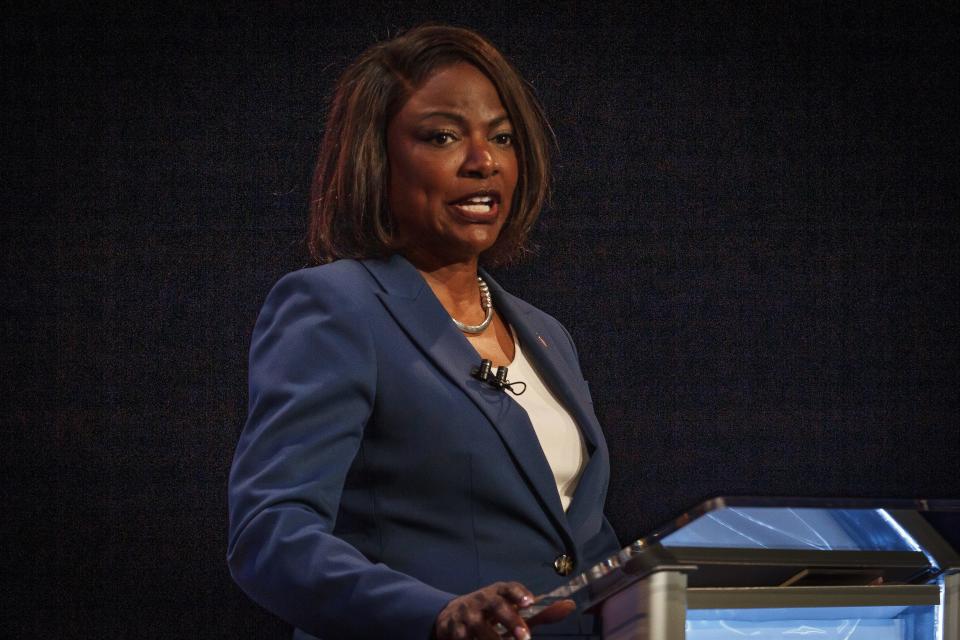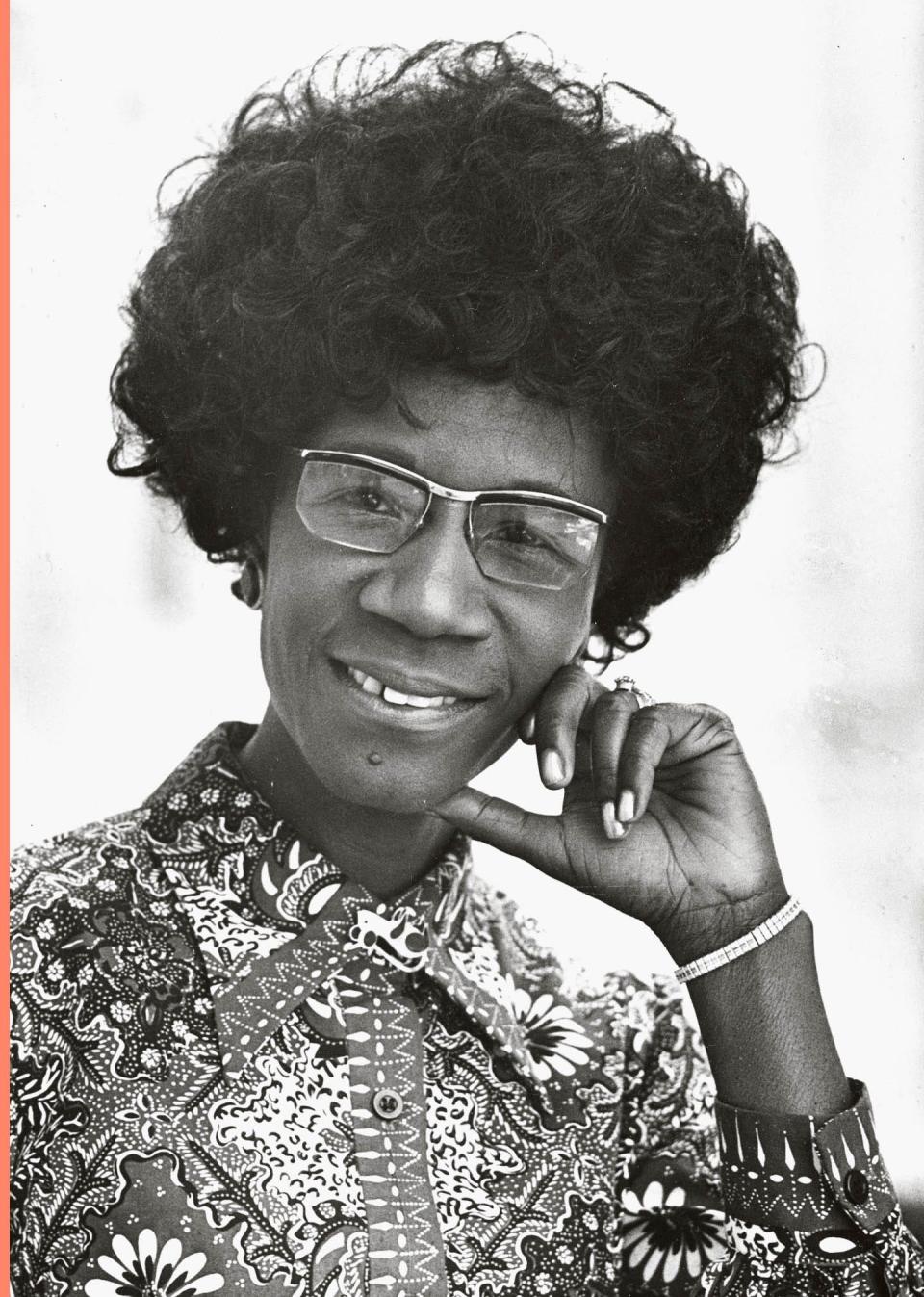Despite historic campaigns, no Black women won Senate or governor races in 2022 midterms
- Oops!Something went wrong.Please try again later.
- Oops!Something went wrong.Please try again later.
- Oops!Something went wrong.Please try again later.
The U.S. will not have any Black women occupying the nation's governor's mansions or the Senate after Tuesday's midterm elections.
In the most high-profile gubernatorial race, Democrat Stacey Abrams was defeated by Georgia Republican Gov. Brian Kemp for a second time.
"I may no longer be seeking the office of governor," Abrams said during her concession speech Tuesday night. "But I will never stop doing everything in my power to make sure the people in Georgia have a voice."
Abrams first made history in 2018 as the first Black women to become a major-party nominee for governor. During the 2022 primary season, Abrams was once again among a handful of Black women vying for the governor's mansion.
Election results live updates: Control of House, Senate still up for grabs. Here's what we know
Three of the candidates went on to become the Democratic nominee for governor, according to Rutgers University's Center for American Women and Politics (CAWP).
They all lost.
Iowa Republican Gov. Kim Reynolds defeated Democrat Deidre DeJear and Alabama Gov. Kay Ivey fended off a challenge from Democrat Yolanda Flowers. Neither of the two races were considered competitive.
In the Senate, four Black Democratic women were major-party nominees, according to CAWP. But only two were in competitive races.
They both lost.
Governor races recap: Arizona, Oregon too close to call; Whitmer, Kemp win reelection

Rep. Val Demings lost her bid against incumbent Sen. Marco Rubio in Florida and North Carolina Republican Rep. Ted Budd defeated Democrat Cheri Beasley.
That none of the Black women running for governor or the Senate won their races highlights the persistent difficulty Black women continue to face in politics –despite being the most loyal voting bloc for the Democratic Party. Black women voted for President Joe Biden by a 93% margin, according to a voter analysis of the 2020 presidential election.
They were key to flipping Georgia blue during the 2020 presidential election, electing Sens. Raphael Warnock and Jon Ossoff during the 2021 runoffs and handing control of the Senate to Democrats.
Yet, Black women continue to face systemic barriers including gender stereotypes, access to political donors and institutional party support when running for elections.
"When you think about the Democratic Party and the support that Black women have continuously given that Party, it's disappointing at best," said Andrea Benjamin, a political scientist at the University of Oklahoma. "At worst, it feels egregious."
Text with USA TODAY politics: Elections news right on your phone, from our top reporters
Black women face racism, sexism when running
The confirmation of Ketanji Brown Jackson to the Supreme Court this year and the elevation of Kamala Harris to vice president in 2020 were lauded by many Black women's organizations as a sign of progress.
But experts said the intersecting factors of white racial resentment and sexism may have contributed to Black women's losses for political office this year.
"What people don't want to talk about is the combo of anti-Blackness and misogyny that continues to hamstring Black women Democratic candidates," said Ashley Bryant Bailey, political strategist and co-founder of Win Black, a digital ad campaign that targets Black voters. "This isn't something that you can just throw money at."
Black women remain underrepresented in statewide executive races, according to Higher Heights For America, an organization that helps elect Black women and mobilizes Black female voters.
In a report published last year, the group notes Black women held just 1.9% of statewide executive offices and only 17 Black women have ever held statewide elected executive offices.
Christine Slaughter, a political scientist at Boston University, said some voters may not have been willing to see Abrams as governor material because she doesn't fit stereotypical standards of womanhood, including not being married or having children.
"Stacey Abrams is a larger Black woman with natural hair. And research has shown that these things matter for how voters evaluate her competency, her warmth, her personability, her electability," said Slaughter.
Slaughter also said that given the prior political experiences Abrams, Demings and Beasley held, their losses send "a clear signal to Black women candidates aspiring for higher office that there is not a clear path the way it is for white male candidates and white women candidates."
Abrams was a minority leader in Georgia's state House. Demings is a sitting House member. Beasley was a former Supreme Court chief justice in North Carolina.
Yet Georgetown University political scientist Nadia Brown said Black women won't stop organizing despite what happened Tuesday night.
"I think people cry, they hug and we regroup," Brown said. "One thing about Black woman organizing is that we understand this as a long game. And that things oftentimes don't work out in the way that we would hope they would but we don't stop working."
2022 different from 2018 campaigns
When Abrams first ran for governor four years ago, Democrats were not in control of the White House or Congress.
Former President Donald Trump was widely unpopular with Democrats – who were itching to take back power from Republicans. Democrats rode the "blue wave" momentum of the 2018 midterms and gained back control of the House.
Although she narrowly lost to Kemp by about 55,000 votes, Abrams garnered 95% of the Black vote, including 96% of Black women and 93% of Black men, according to her campaign.
It foreshadowed how competitive Georgia would be in 2020.
But Abrams couldn't recreate that same momentum when she ran for governor in 2022.
Today, Democrats control Congress and the White House. Throughout the midterm cycle, Democrats faced difficult political headwinds – including high inflation and Biden's low approval ratings – which led to predictions of a "red wave."
For much of the 2022 campaign, Abrams trailed Kemp in polling. A recent composite of surveys from FiveThirtyEight showed Kemp leading Abrams by 7.9 percentage points. Throughout the campaign cycle, Abrams focused on turning out a coalition of minority, young and first-time voters.
It wasn't enough to beat Kemp.
Exit polling from NBC showed that 74% of white voters backed Kemp, while 90% of Black voters supported Abrams. More than half of Latinos, 55%, backed Abrams, as did Asian Americans at 54%.
"Black women still have a series of barriers as it relates to our candidacies," said Glynda Carr, president of Higher Heights for America. "But in these highly watched races, these women significantly raised money and in many incidences outraised their opponents. But there's still work to be done."
Beasley, in North Carolina, outraised Budd but was hit with spending from national Republicans, including the Senate Leadership Fund spending $38 million against her campaign.
"We have seen for decades that it is incredibly difficult to get the type of investment and resources to allow for Black women candidates to be successful," Bryant Bailey said. "Whether we're talking fundraising by the Democratic Party or other donors and supporters. Or even media attention."
Democrats may have defied political conventions in 2022 as control of the House and Senate is still up for grabs. Midterm elections typically don't favor the party in power.
And the U.S. will have one Black governor – Democrat Wes Moore in Maryland.
Voted into history: Wes Moore to be Maryland's first Black governor; first Gen-Z House member in Fla.; more
Black women in the Senate unsuccessful but make some gains elsewhere
There were some Black women who did make history Tuesday night.
Democrat Summer Lee became the first Black woman elected to Congress from Pennsylvania. In Massachusetts, Democrat Andrea Campbell is the first Black woman elected attorney general.
Only two Black women have been elected to the Senate – Harris from California in 2016 and Chicago Democrat Carol Braun Moseley in 1992.
After Harris was elevated to vice president in 2020 there remained no Black women in the Senate. Yet experts said despite Demings and Beasley's losses, more Black women will continue to run.
"What we're going to see is refining and redefining our strategy on how we are supporting and running Black women for office," Carr said.
Carr called it the Chisholm effect, a reference to Shirley Chisholm, the first Black woman elected to Congress in 1968.

In 1972, Chisholm was the first African American and the first woman to be a major party candidate for U.S. president.
Black women who ran for higher office 50 years after Chisholm's bid for the presidency, "are the beneficiaries of that Chisholm effect," said Carr.
"Stacey Abrams, Val Demings, and Cheri Beasley, in particular, women who were running in the Deep South, continue to build on the foundations and are the modern day architects of the elections that we are going to begin to build for 2024 and 2026," Carr said.
This article originally appeared on USA TODAY: Midterm elections result in losses for Black women in statewide races
